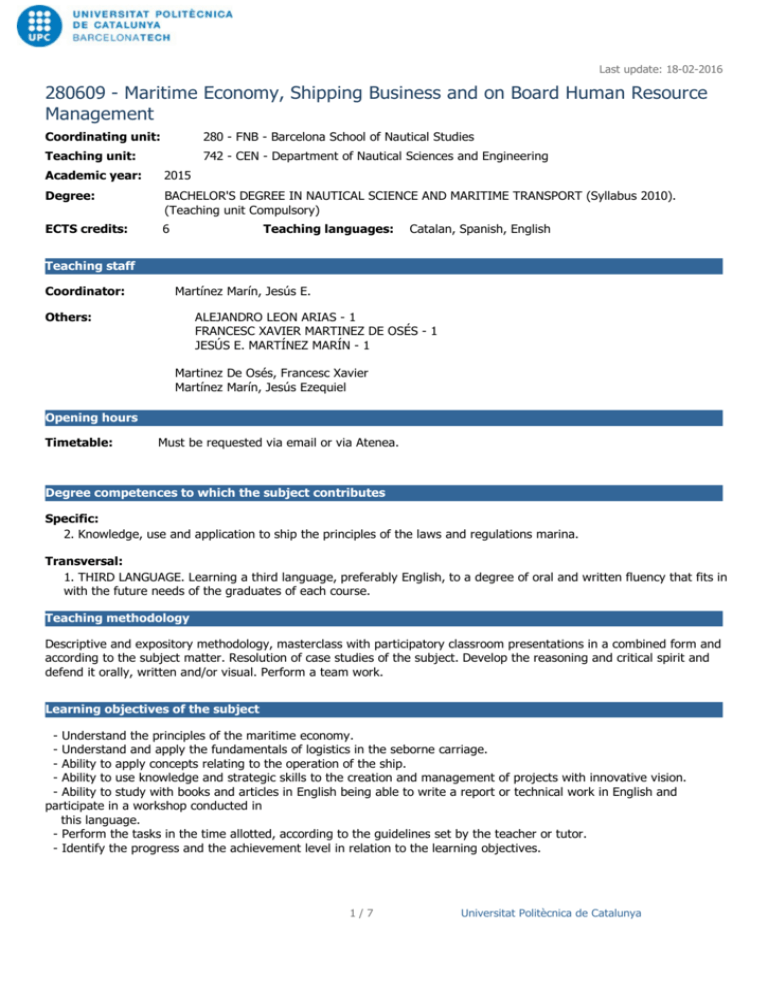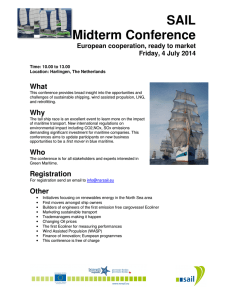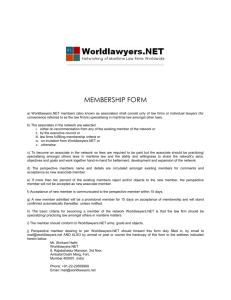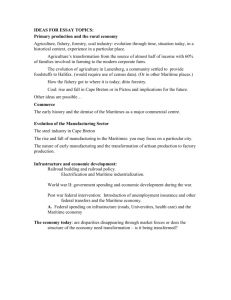Maritime Economy, Shipping Business and on Board Human
advertisement

Last update: 18-02-2016 280609 - Maritime Economy, Shipping Business and on Board Human Resource Management Coordinating unit: 280 - FNB - Barcelona School of Nautical Studies Teaching unit: 742 - CEN - Department of Nautical Sciences and Engineering Academic year: 2015 Degree: BACHELOR'S DEGREE IN NAUTICAL SCIENCE AND MARITIME TRANSPORT (Syllabus 2010). (Teaching unit Compulsory) ECTS credits: 6 Teaching languages: Catalan, Spanish, English Teaching staff Coordinator: Martínez Marín, Jesús E. ALEJANDRO LEON ARIAS - 1 FRANCESC XAVIER MARTINEZ DE OSÉS - 1 JESÚS E. MARTÍNEZ MARÍN - 1 Others: Martinez De Osés, Francesc Xavier Martínez Marín, Jesús Ezequiel Opening hours Timetable: Must be requested via email or via Atenea. Degree competences to which the subject contributes Specific: 2. Knowledge, use and application to ship the principles of the laws and regulations marina. Transversal: 1. THIRD LANGUAGE. Learning a third language, preferably English, to a degree of oral and written fluency that fits in with the future needs of the graduates of each course. Teaching methodology Descriptive and expository methodology, masterclass with participatory classroom presentations in a combined form and according to the subject matter. Resolution of case studies of the subject. Develop the reasoning and critical spirit and defend it orally, written and/or visual. Perform a team work. Learning objectives of the subject - Understand the principles of the maritime economy. - Understand and apply the fundamentals of logistics in the seborne carriage. - Ability to apply concepts relating to the operation of the ship. - Ability to use knowledge and strategic skills to the creation and management of projects with innovative vision. - Ability to study with books and articles in English being able to write a report or technical work in English and participate in a workshop conducted in this language. - Perform the tasks in the time allotted, according to the guidelines set by the teacher or tutor. - Identify the progress and the achievement level in relation to the learning objectives. 1/7 Universitat Politècnica de Catalunya Last update: 18-02-2016 280609 - Maritime Economy, Shipping Business and on Board Human Resource Management Study load Total learning time: 150h Hours large group: 44h 29.33% Hours medium group: 11h 7.33% Hours small group: 0h 0.00% Guided activities: 5h 3.33% Self study: 90h 60.00% 2/7 Universitat Politècnica de Catalunya Last update: 18-02-2016 280609 - Maritime Economy, Shipping Business and on Board Human Resource Management Content (ENG) Economic characteristics- Learning time: 12h 20m Theory classes: 4h Practical classes: 1h Self study : 7h 20m Description: Supply and Demand. The Market and its classification. Market Structures. Main macroeconomic indicators. Transportation Features. Hinterlands and Forelands. Maritime Economics and Meteorology. (ENG) The maritimisation of Contemporary Economics. Learning time: 11h 20m Theory classes: 4h Self study : 7h 20m Description: Considerations about the maritime transport nowadays. The so-called "Maritime Cycle" in the economy. Maritime traffics and ship types. The freight, concept and modalities. The INCOTERMS and its application to containerized traffic. Terminology often used in charter parties. Splitting of costs between owner & charterer in the charter party. Examples of charter parties. The flags of convenience. (ENG) Global Port Network Learning time: 12h 20m Theory classes: 4h Practical classes: 1h Self study : 7h 20m Description: Main ports of the world, its location, their most relevant traffic. Lloyds Maritime Atlas. Sources of information on the net about the ports. Detailed study of some ports. Maritime Trade Routes Learning time: 10h 20m Practical classes: 3h Self study : 7h 20m Description: Type of shipping routes. Determining factors in the path to follow. Strategic passages. Geographical distribution of maritime traffics. 3/7 Universitat Politècnica de Catalunya Last update: 18-02-2016 280609 - Maritime Economy, Shipping Business and on Board Human Resource Management Interior and Ocean Channels Learning time: 11h 20m Theory classes: 4h Self study : 7h 20m Description: Definitions. Corinth Canal, Kiel Canal, Panama Canal, Suez Canal, St. Lawrence Seaway. European navigation channels, its operation, characteristics and tolls. The special drawing right. (ENG) Containerization. Learning time: 16h 50m Theory classes: 4h Practical classes: 2h Guided activities: 2h Self study : 8h 50m Description: Basics. The container. Type of containers. ISO codes. Logistics flow diagrams. Terminology of containerized traffic. Consolidation and deconsolidation of containers. Clauses, concept of demurrages and detentions. Multimodality of it. Container ships, planes and the Baplie files (Baplie Files). Examples of B /Ls and Baplie Files. (ENG) The High speed, competitiveness and viability Learning time: 12h 20m Theory classes: 4h Guided activities: 1h Self study : 7h 20m Description: Applicable international standards. DSC and HSC Codes. Advanced Marine Vehicle Typology. Their advantages and disadvantages. Its economic viability. Its Present and future. (ENG) The Oil Trade. Learning time: 10h 20m Theory classes: 2h Guided activities: 1h Self study : 7h 20m Description: General features. Global transport of oil. Routes and international traffic. Major oil ports.. Tankers, its characteristics. 4/7 Universitat Politècnica de Catalunya Last update: 18-02-2016 280609 - Maritime Economy, Shipping Business and on Board Human Resource Management (ENG) Els Costos d'Explotació del Vaixell. Learning time: 15h 20m Theory classes: 4h Practical classes: 3h Guided activities: 1h Self study : 7h 20m Human resources in shipping companies. Learning time: 10h Theory classes: 3h Practical classes: 1h Self study : 6h Description: The institution vessel: sociological connotations. Inner life. Crews multinacionals. Flags of convenience. Human resources in shipping companies. Learning time: 10h Theory classes: 3h Practical classes: 1h Self study : 6h Description: The crewman. Characteristics of life on board. Crewmember relations with the outside world. Human resources in shipping companies. Learning time: 6h Theory classes: 2h Self study : 4h Description: Hiring crews. Shipping companies and intermediary agencies. (ENG) Human resources in the shipping companies. Learning time: 11h 30m Theory classes: 3h Practical classes: 2h Self study : 6h 30m Description: Hierarchical structure. Command. Leadership. Motivation. 5/7 Universitat Politècnica de Catalunya Last update: 18-02-2016 280609 - Maritime Economy, Shipping Business and on Board Human Resource Management Qualification system Tests of short duration for the continuous assessment (20 %). (Not possible to recover it- if all continuous assessments are not completed, you will lose 20% corresponding to the continuous assessment) Tests of long answer (60 % ). Teamwork and reports together with oral presentations (20 %). The final mark is the sum of the following partial scores: Nfinal = 0,60 Npf + 0,20 Nac + 0,20 Ntip Npf: final test score. Nat: Continuous assessment mark. Ntip: Score for papers, reports and presentations. Both the final test as well as the continuous assessment tests have a multiple choice test part and other part of short questions. Its duration goes from 2 to 2.5 hours. The score of the teamwork reports and presentations bears in mind the students ability to teamwork, the deepness achieved in the chosen subject, and both visual and oral presentations thereof. Only those students who did the final examination and who obtained an overall grade for the course between 3 and 4.9, will have the chance to make a new reassessment exam , which will take place a few days after the global notes are pùblished, according to the timetable set by the FNB. This exam will consist of a series of multiple choice tests and short development questions about all course topics that the student should overcome in at least a 60 % to obtain so a 5 points score as overall final grade of the course. Regulations for carrying out activities A first control which represents the 20% of the overall assessment. A team work on a specific topic and its multimedia exhibition will represent the other 20% and the final exam which will count for 60% of the total grade. Shall be deemed "not submitted", the student who fails to appear at the final test, which represents 60% of the grade. As for the final reevaluation exam of the subject whose maximum score will be 5 , it is required a minimum mark of 6 out of 10. If all continuous assessments are not completed, you will lose 20% corresponding to the continuous assessment 6/7 Universitat Politècnica de Catalunya Last update: 18-02-2016 280609 - Maritime Economy, Shipping Business and on Board Human Resource Management Bibliography Basic: Jesús E. Martínez Marín, Agustín Montori, Carlos Escribano. Manual del Transporte Marítimo [on line]. 1era. Barcelona: Marge Books, 2016 [Consultation: 03/02/2016]. Available on: <http://www.margebooks.com/es/281767/manual-transportemaritimo.htm>. ISBN 9788415340317. Lloyd's maritime atlas of world ports and shipping places. 24th Edition. Essex: Lloyd's MIU, 2007. ISBN 9781843116042. Incoterms 2010 : reglas de ICC para el uso de términos comerciales nacionales e internacionales. Barcelona: Comité Español Cámara de Comercio, 2011. ISBN 9788489924468. Rodriguez-Martos Dauer, Ricardo. El Buque mercante: un análisis sociológico [on line]. Barcelona: Edicions UPC, 1996 [Consultation: 26/04/2012]. Available on: <http://hdl.handle.net/2099.3/36171>. ISBN 8483011506. Economía del sector marítimo. Primera. Madrid: Instituto Marítimo Español, 2010. ISBN 9788481987904. Complementary: Fernandez Moran, Fernando. Los Costes de explotación del buque. 1ª Edición. Madrid: Comme, 1995. ISBN 847916042X. Stopford, Martin. Maritime economics. 3rd ed. London: Routledge, 2009. ISBN 9780415275583. McConville, James. Economics of maritime transport: theory and practice. London: Witherby, 1999. ISBN 1856091627. González Laxe, Fernando; Sanchez, Ricardo J. Lecciones de economía marítima. La Coruña: Netbiblo, 2007. ISBN 9788497450423. Mari Sagarra, Ricard [et al.]. El Transporte de contenedores: terminales, operatividad y casuística [on line]. Barcelona: Edicions UPC, 2003 [Consultation: 26/04/2012]. Available on: <http://hdl.handle.net/2099.3/36758>. ISBN 8483016907. Berger, P. L. Invitación a la sociología: una perspectiva humanistica. Reimp. 2002. Barcelona: Herder, 1986. ISBN 8425415306. Hernandez IzalL, S. Aproximación a la sociología marítima. Barcelona: Bosch, 1988. ISBN 8476980302. McGregor, D. Mando y motivación. México: Diana, 1982. ISBN 9681307879. Polo, Gerardo. Estructura y control del coste en el transporte marítimo. Madrid: Escuela tecnica superior de ingenieros, 1979. Musso, E [et al.]. Gestión portuaria y tráficos marítimos. La Coruña: Netbiblo, 2004. ISBN 8497450787. Alcaraz Varó, Enrique; Castro Calvín, Jose. Diccionario de comercio internacional. Barcelona: Ariel, 2007. ISBN 9788434456624. Chapman, P. Trouble on board: the plight of international seafers. New York: ILR Press: Ithaca, 1992. ISBN 0875461816. Lane, T. Grey dawn breaking. Dover: Manchester University Press, 1986. ISBN 0719022495. 7/7 Universitat Politècnica de Catalunya






